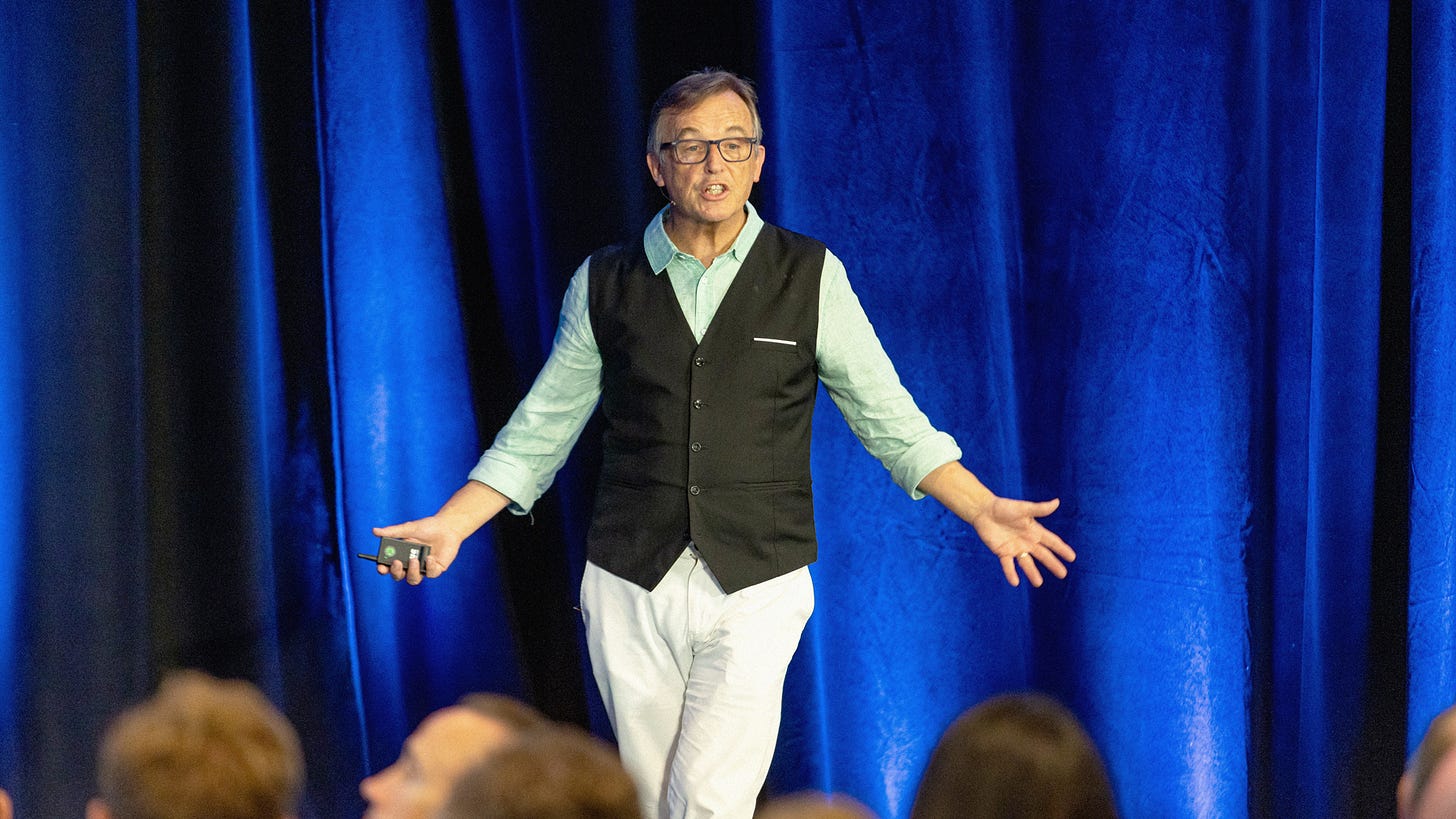The "wizard" behind TED goes from ideas to action on climate
Plus: The farmer’s A.I. Manac in the Shocked podcast

The man who made TED a household name is moving from ideas to (climate) action.
Why he matters: After nearly 25 years at TED, Chris Anderson is stepping back to launch a new initiative seeking to mobilize businesses on climate change — as political focus wanes and investor energy shifts to AI.
Anderson announced Wednesday that Sal Khan, educator and founder of Khan Academy, would take over the nonprofit TED conference, which produces expert thinkers’ “TED Talks.”
“Ideas can change the world,” Anderson said after a recent private gathering about the new initiative in Half Moon Bay, Calif. “But only if someone can figure out how to turn them into action. That’s what I see cleantech entrepreneurs doing every day.”
Read the full story in Axios, and stay tuned next week for a behind the scenes look into the exclusive gathering Anderson recently hosted in California.
Driving the news: Anderson’s new venture is a combined new fund, coalition and convening called All Aboard.
It compels an atypical level of coordination and collaboration for investors, even among those funding climate technologies who are often more collaborative than most.
The goal is to boost startups from lab proof of concept to massive scale, which is particularly hard and expensive for capital-intensive technologies such as climate.
Zoom in: Anderson himself isn’t a household name — about once a month he gets called “Ted.” But he has one of the broadest and most unique global networks because he has led TED for so long and engaged with its speakers.
“It turns out a lot of those minds are concerned about climate,” he said.
Flashback: Anderson, who accumulated significant wealth through his early media ventures, traced the beginning of his journey toward this new chapter back to 2019. That was when he helped launch TED Countdown, an initiative specifically about climate change.
With a front-row seat to pretty much any TED talk, Anderson credits his evolution on the topic to leaders who have, unsurprisingly, given TED talks.
Two he named: Mexican climate activist Xiye Bastida and John Doerr, the philanthropist and investor whom Anderson said helped convince him to launch Countdown.
“I became more and more persuaded that the biggest impact would come from changing what businesses did, and the biggest impact on that would be the disruption caused by exciting startups in this space,” Anderson said.
The intrigue: Anderson, an affable 68-year-old who was raised in Pakistan by British parents, carries himself as an extrovert but says he’s an introvert.
Across one evening during Climate Week NYC and three days in Half Moon Bay shortly thereafter, Anderson hosted what in many ways felt like a tailor-made TED conference for a small group of invited climate investors and entrepreneurs.
The big picture: Anderson is going all-in on climate during what is otherwise a trough of climate momentum.
President Trump is repealing U.S. climate policies, global attention to the matter is waning and investors are shifting their excitement — and dollars — to artificial intelligence.
Anderson is undeterred, seeing the AI boom as a tailwind for cleantech and the government as no longer central.
“At the stage we’re at right now, the government role is less influential than we know. Things have moved and are unstoppable.”
Follow the money: The All Aboard fund acts as a double-matching co-investing fund alongside a vetted group of more than a dozen well-known investors, including Bill Gates-led Breakthrough Energy Ventures and Energy Impact Partners.
The fund, which is being raised now, is currently just $300 million, which Anderson acknowledged at the Half Moon Bay gathering isn’t nearly enough. He hopes it reaches billions in the next couple of years.
His relatively new arrival into the climate world — the first All Aboard convening was last year — could sit poorly with those invested (both monetarily and morally) in the cause far longer than Anderson.
But he exuded a high degree of humility that attendees said softened simmering skepticism.
“I accept it may not work,” Anderson said at the gathering at his New York home during Climate Week. “Many will look quite skeptically about this whole thing.”
What they’re saying: Multiple attendees at the convening in late September expressed mostly intrigue at both Anderson and his new effort.
“He’s kind of a wizard. He makes magic happen,” said Nigel Topping, a longtime climate leader who helped launch the TED Countdown with Anderson in 2019 and was at the gathering. “He’s pretty courageous. The chances of failure of something as bold as this are always high.”
The bottom line: Topping, also a climate adviser to the U.K. government, said Anderson’s “arc from ideas worth sharing to actions worth taking is quite clear. If he’s successful, it will be the biggest thing he will have done.”
Shocked podcast: The farmer’s A.I. Manac
AI will help us better forecast the weather, which will be nice for the average person, but it will be livelihood-saving for farmers.
In the latest Shocked podcast episode, we look at how AI is applied for good to people who arguably need it the most.
As a reminder: Shocked is a podcast hosted by yours truly and supported by the University of Chicago’s Institute for Climate and Sustainable Growth. You can listen to our prior episodes spanning AI’s energy use, geoengineering and more by clicking here.

